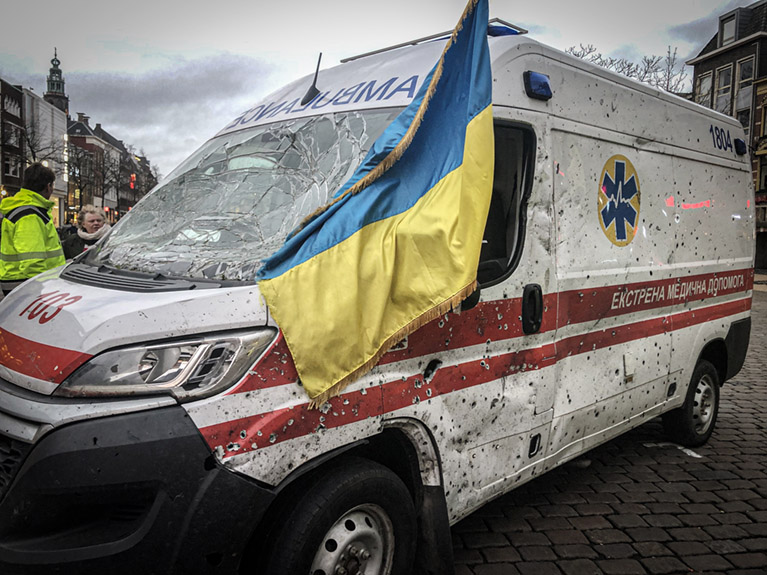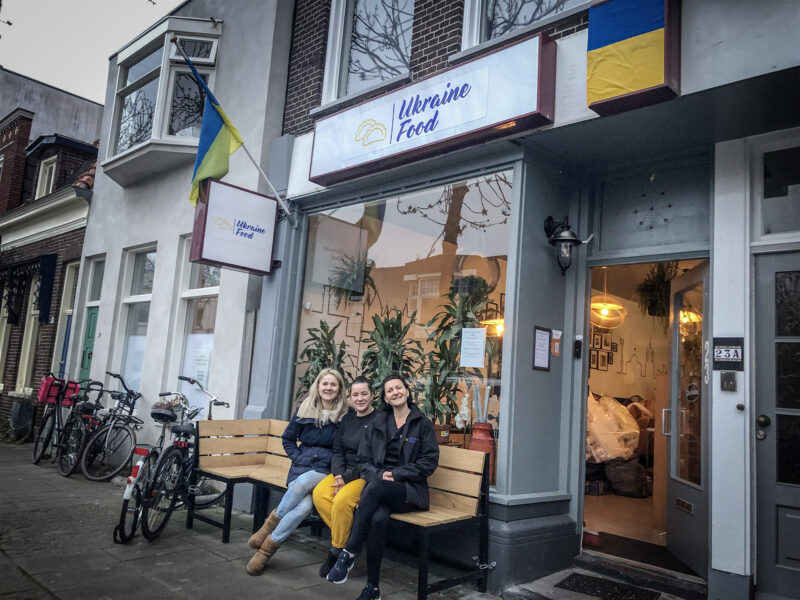
One year of full-scale war in Ukraine
‘We all pay for the Russian invasion’
‘The awareness is declining here in the Netherlands’, Gerlinde Korterink says. She’s a Dutch volunteer at Zeilen van Vrijheid (Sails of Freedom), a non-profit organisation that aims to deliver ambulances, medical aid, and emergency vehicles to Ukraine.
People probably aren’t as shocked by news of the war as they were before, she speculates. And since the war isn’t in their backyard, daily life pretty much continues as normal for them. It’s human nature, she realises. ‘But the war is happening not far away from the Netherlands.’
Korterink and her colleagues are hoping to renew the attention for the war by travelling around the Netherlands with a Ukrainian ambulance that was destroyed by a Russian missile. On Monday, they set up on the Vismarkt.
‘It happened in the middle of night in Kharkiv’, says Korterink. ‘The Russian army launched a missile to destroy this ambulance.’ It’s lucky no one got hurt, she says, but the Ukrainians lost an ambulance that they badly needed.
Negotiations
Yulia, a UG staff member who has lived in the Netherlands for five years, has also noticed that the situation in Ukraine has become the new normal for people here. That’s understandable, she says. ‘People showed they care by listening to my story and often asking whether my family was okay, whether I was okay.’
People are fighting for the survival of their culture, their language
Most people still show tremendous support, she says, but there are also those who ask her why her country doesn’t negotiate with the Russian government to end the war. ‘Some people don’t understand what’s at stake. It’s not a question of negotiating some conditions, it’s a question of whether the country, the nation, survives or not’.
The Ukrainians aren’t just fighting for land, she emphasises: ‘They’re also fighting for the survival of their culture, their language, everything related to our identity.’
Last summer, Yulia went back to western Ukraine to visit her parents. The air raid siren went off every day, several times a day. ‘I was scared and didn’t know what to do the first time I heard the alarm’, she says. ‘It sounds sad, but my family and friends are used to it.’
Changing attitude
Yuliya Hilevych, assistant professor of economic and social history, agrees with her namesake that negotiation is not an option. ‘To end the invasion we’d need to give up either territory or our sovereignty, that’s what the Russians want.’
Before full-scale war broke out, the general opinion in the world was that Russia and NATO needed to negotiate about the ongoing tensions. Ukraine wasn’t seen as a negotiating power, Hilevych says, it was like its existence was denied. That bothered her a lot, because it felt like they were still in the Soviet Union and had to submit to Moscow. ‘It’s like we needed to please Russia.’
To end the invasion we’d need to give up either territory or our sovereignty
That’s changing now, she says, as is the attitude towards supplying weapons to Ukraine. ‘There is much more acceptance now of the fact that Ukraine needs to be helped, especially with military aid’, says Hilevych. Last year, when she was collecting money for her country, she was often told by people that they only wanted to donate for humanitarian help, not for the military.
Asking Ukrainians how their family is doing shows you care, Hilevych says, but actually doing something is better, and donating money is one option.
Donations
Kostia Gorobets, assistant professor at the Faculty of Law, is trying to get people to donate as well. He was having problems concentrating after the war started, but taking action helps, he says. He printed cards in the colours of the Ukrainian flag with the names of two funds on them, a short description and a QR code. He also drew up a scheme to guide people on how to donate and to show them where the money is going: humanitarian help, rebuilding projects, animal shelters, military aid.
But he, too, sees that people are less willing to help than before. ‘I have to keep reminding them that the war is ongoing, and not that far away from Groningen.’ Ukrainians need funds to rebuild their country and they will need more even after the war ends. ‘We all pay for the war directly or indirectly’, he says.
The daily rockets will one day be a thing of the past, but they will always be remembered, Hilevych says. ‘This is a whole new page in the history of Europe, because Ukraine will never be the same again.’
Support for Ukraine

People in Groningen have been supporting Ukraine in different ways:
- The UG has set up an emergency living allowance fund for Ukrainian students. According to spokesperson Elies Kouwenhoven, only a handful of students ended up using that. Ukrainians can also get more time to pay their tuition fees.
- UMCG employees Willemien Pol and Alie Enting collected medical supplies for hospitals in Ukraine. Willemien’s husband, who fixes up old ambulances for Ukraine, transported the supplies there.
- Groningen restaurant Ukraine Food is organising a charity event on February 24 at the Grote Markt. Soup and pastries will be sold from 4 p.m. onwards and people can decide themselves how much they want to pay for them. ‘All proceeds are donated to Ukraine’, says Valentyna, one of the owners.